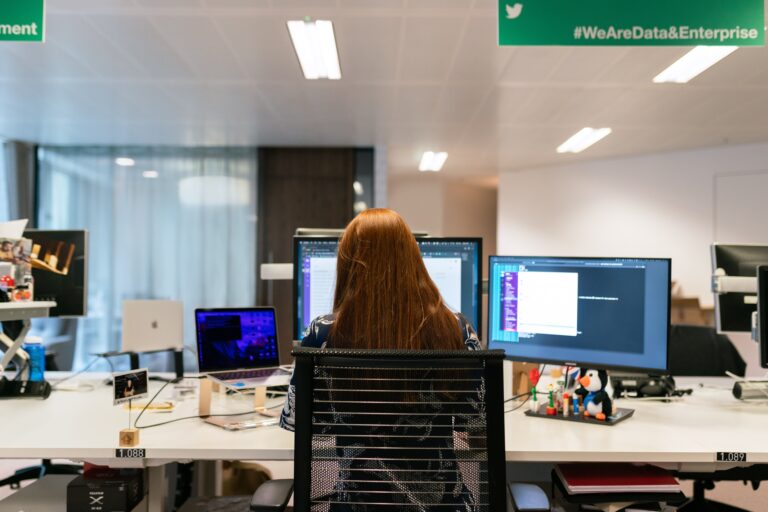Biased algorithms, digital violence, exclusion of women from digital history: in her book” Technofeminism », which will be published on February 15 by Éditions Grasset, the journalist Mathilde Saliou returns to the discriminatory mechanisms that structure the virtual world… to the point of infiltrating our daily lives.
Interview with Mathilde Saliou, author of “Techno Feminism”
To miss. Women have long been neglected in the history of information technology and new technologies. How to explain it?
Mathilde Saliou. This is a process we frequently observe in the way we (re)write history. We focus on a few profiles that catch the most light, and these are often male profiles. In technology one of the most tenacious myths is that of genius, as in art. For example, Steve Jobs is often touted as a genius of technology and marketing. But this attraction to the figure of genius casts into the shadows all the little hands that made it possible to discover. It’s quite significant when you look at programming: it’s the invisible work of computing. We don’t see all the people who worked behind the scenes, so we forget them.
However, you show in your work the essential role played by programmers and computers…
Indeed. At the start of World War II and in the 20-30 years that followed, technology and computing were not formalized industries as they are today. There was a certain “artistic vagueness” that made it possible to go against certain recurring patterns, and therefore to keep women in these sectors, to give them important roles in the development of great tools and languages, which have become essential for the whole industry. But, in the 1970s and 1980s, many companies began to realize that IT tools could help them streamline their operations. To satisfy a growing need, we wanted to better structure the digital sector, opening dedicated schools, putting men in positions of power, massively recruiting and developing the idea that the best programmers are men…
You talk about a digital gender gap. What is it about ?
Globally, women have less access to digital than men. In 2023, they’re even less likely to know how to code, and are the originators of only a small fraction of online content. A very concrete example is Wikipedia: the vast majority of biographies found there are those of men. And this is certainly explained by the fact that fewer women contribute to enriching this encyclopedia. But the gap is not only based on gender, there are also economic, political, social and ethnic disparities…
You show that algorithms also contribute to accentuating these inequalities, which has a direct impact on the user experience. What is it due to?
Algorithms are trained on content available for free online. So if we train a language recognition algorithm on discussion pieces such as those found on certain forums, where the words are often violent, particularly regarding all minorities, then the algorithm will fail to make sense of things and he will think that we are communicating in this way. If you educate him on an archive like Wikipedia, where the proportion of men is much higher than that of women, then he will think there is a basic inequality and will perpetuate it.
Globally, women have less access to digital than men.
Mathilde Saliou
You also engage in cyberbullying and misogyny online. How to explain this feeling of impunity that exists in the digital space?
Many studies try to explain it: being online can be like being in a video game for some people. Let’s not imagine that the people in front of us are anything more than simple avatars. We also get the impression that we are anonymous, which disinhibits some people. It’s a real issue that needs to be taken up again, because it becomes a democratic threat, which prevents the debate of ideas and fuels fractures that shouldn’t be. There is a real issue, especially for women, about the right to move freely in the digital space.
How to create a more inclusive digital space?
First of all, digital awareness work needs to be done, to better understand how this space and the logic of social networks work. This means understanding the responsibilities of larger accounts and the exposure they receive. People with large audiences should be more conscientious. On the purely technical side, which is how we designate these digital spaces, we need to introduce more diversity among the people who program the machines, to create products that work well for everyone. Remember this health application marketed by Apple, capable of great feats, but forgetting to include a menstrual calendar… We also need more diversity in thinking, both within the digital industry, but also at the level of society: these debates cannot be limited to the IT sector, we need to talk about both professionals and the general public, which will eventually be led to use these technologies.
image caption from front page: ThisisEngineering RAEng
Source: Madmoizelle
Mary Crossley is an author at “The Fashion Vibes”. She is a seasoned journalist who is dedicated to delivering the latest news to her readers. With a keen sense of what’s important, Mary covers a wide range of topics, from politics to lifestyle and everything in between.





